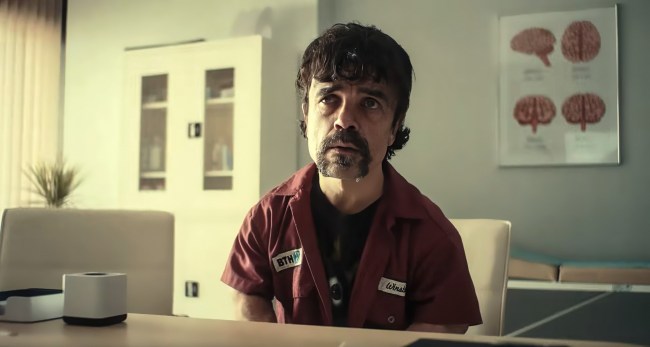When it works well, film marketing can feel something like a magic trick. Maybe even a superpower?
Macon Blair’s “The Toxic Avenger” recently made headlines with a marketing move that saw several outlets reporting the film had relieved at least $5 million in medical debt through a hefty donation from Cineverse that the film’s ticket sales would supplement. For every additional $1 million “The Toxic Avenger” made in theaters, another million in medical bills would also disappear. The patients the campaign would help came from a wide pool of people in need — with debt resold at a fire-sale price.
That story — about a scrappy indie movie sticking it to America’s broken healthcare system through a triumphant rush on the box office — is true, mostly. After three weeks, Cineverse has erased at least $7 million in medical debt, thanks to “The Toxic Avenger.” The activation lines up well with the themes of Macon Blair’s mutant movie, starring Peter Dinklage as a new embodiment of the cult-classic hero.
“Medial debt is crippling for American families,” said Lauren McCarthy, senior vice president of marketing at Cineverse. “We’ve all experienced it, and we all know someone who’s experienced it.”
The final amount of medical debt forgiven by the studio could land closer to $8 million, if it makes much more in theaters, and if you account for other donations made directly. The “Toxic Avenger” activation cost just $70,000 for the studio to pull off, and plenty of other low-budget releases could be doing this, too.
“One dollar, on average, erases around a hundred dollars or more of medical debt,” explained Daniel Lempert, vice president of communications and marketing at the nonprofit Undue Medical Debt.
“It took us a while to wrap our heads around that math,” said McCarthy. “But it was one of the most exciting parts of the process [promoting this film], hearing that all this was possible.”
“Medical debt tends to be the cheapest of the debts,” said Lempert. That’s “because the demands on people, to pay for healthcare through a copayment or a deductible, are increasing.”
Unpaid medical debt is exceedingly common in the United States. The Kaiser Family Foundation, a leading source for healthcare data, estimates that more than 100 million people are struggling with medical debt today. That puts the total at a staggering $220 billion or more — a number that shows just how overwhelming and urgent the crisis has become.
“It’s very likely that figure is an undercount because this is a crisis that’s very hard to track,” Lempert continued. “A lot of people will borrow from friends and family, and the number one reason people will do a GoFundMe campaign tends to be around healthcare debt.”
 Peter Dinklage in ‘The Toxic Avenger’Courtesy Everett Collection
Peter Dinklage in ‘The Toxic Avenger’Courtesy Everett Collection
Facing its own challenges in a finicky market, “The Toxic Avenger” initially had trouble finding a home. Rumors that it was “unmarketable,” possibly for gratuitous violence, swirled after it premiered at Fantastic Fest in 2023. When Cineverse rescued it last year, their recent triumph with the extremely graphic “Terrifier 3” only made speculation about its content gorier.
Partnering with Undue Medical Debt was a smart course correction that played on the film’s heart. “At its core, [‘The Toxic Avenger’ is about] activism and optimism that makes the movie so charming,” said McCarthy. “That’s why it’s had this consistent fandom that’s so highly engaged.”
McCarthy said “The Toxic Avenger” cost the studio less than $5 million combined to acquire and market. By comparison, Cineverse spent $500,000 marketing “Terrifier 3,” which could have theoretically paid for $50 million in medical debt when the resale rate is $1 to every $100.
“I got an initial quote for a [another stunt] that could have been an option,” said McCarthy, who described a flash mob spectacle that would’ve cost $50,000 at least. “When you think about the frivolity of what that money could do, and what we are doing instead, it puts things in perspective. … We do a lot of stunts because we certainly don’t put anywhere near the budget into paid media than any other studio does. We do things that activate the community online that they really respond to. There’s been a lot of stunts. Then we rely on organic digital pickup and we amplify a bit, but we are relying on people to see the stunt, get excited by the stunt, think it’s funny, and share it with their friends, and that makes the community bigger.”
Lempert broke down “The Toxic Avenger” math as a case study for the activation strategy, examining ticket sales from opening day on August 29 to the present. The effort has been widely praised on social media, and discussing the initiative on Reddit, several fans joked about the amount of debt forgiveness that could be achieved with the amount of money Hollywood spends on big-budget films.
“People are finding catharsis in narratives about the healthcare system and inability to pay and who deserves access to care that helps keep them and their family alive,” said Lempert. You may have heard of Undue Medical Debt before now for their 2016 stunt on “Last Week Tonight with John Oliver.” The gag for the political talk show was touted as one-upping Oprah for the biggest charity giveaway in television history, and it tested an important concept for Undue.
“The model is very compelling,” said Lempert. Undue has promoted two other films, including 2019’s “Buffaloed” with Zoey Deutch and last year’s “Ordinary Angels” with Hilary Swank.
“It speaks to how pervasive this crisis is that we have such an eclectic roster of partners,” he said. The team at Undue will work with “The Toxic Avenger” PR team to personalize literature that will be sent out to patients with forgiven debt, thanks to the film, later this year.
“We’re slightly slammed, so we haven’t fully gotten there, but I’m hoping that it can be as delightful and surprising to the people receiving the letters as possible,” said McCarthy around the film’s opening weekend. “We’re going to try to cook up something that is charming enough for them to want to talk about it.”
“The Toxic Avenger” has so far made a self-reported $2.9 million for Cineverse (although lower insider estimates place it closer to $2.3 million), and Blair’s mutant movie doesn’t seem to have been substantively aided by the Undue partnership.
Still, it’s a clever bang-for-your-buck PR purchase from Cineverse — which continues to face blowback for the political reputation of “Terrifier 3” — and a super-charged victory for the nonprofit.
Working with Undue Medical Debt is an opportunity for your film to become an “empathetic outlet,” Lempert said. The organizers are easy to reach through their website, and no matter what happens at the box office, discussing Americans’ everyday battles with the healthcare system can “destigmatize an issue that is certainly no fault of any patients,” he said.
“The Toxic Avenger” is coming to digital release on September 30.


